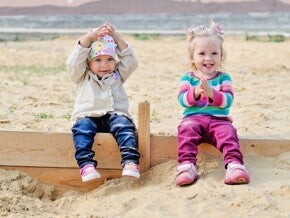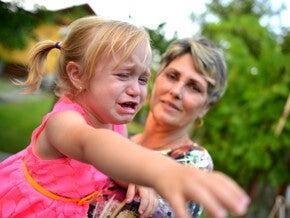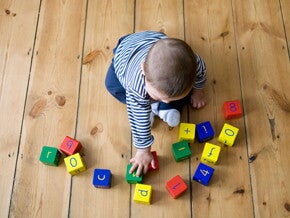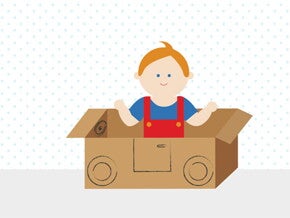
Toddler Language Development
Language milestones depend on your toddler’s genetic abilities and the environment in which they are exposed to. Some toddlers are happy to babble away, while others wait until they have mastered the words in their head and then feel confident enough to speak them.
From around 12 to 20 months your toddler’s speech takes off with a few simple and efficient words with meaning such as finished, no, and more.
From around 15 months they will put their first two or three words together with meaning. Your toddler will repeat their favourite onomatopoeias (words that imitate sounds to a specific object, such as ‘brum-brum’). Two-words with meaning, such as mummy gone begin to appear.
By around 18 months your toddler uses up to 20 more words with meaning but understands and recognises many, many more. Your toddler understands much more than they speak. You can encourage their progress by looking at words and pictures together or by singing nursery rhymes to them. It is especially important to continue talking to them in many different situations. Speaking in person is the best way of enriching vocabulary and stimulating their curiosity; it is not listening and watching from the television.
The selection of words in your toddler’s repertoire increases and they begin to talk more to communicate.
Words and sentences – the beginning of conversation
Keep in mind that talking happens at different times for different children. When your toddler starts to speak, their first few words will probably be the names of familiar people, their favourite toys, or different body parts. Early words may be hard to understand and often sound like babble.
- At around 2 years old language progresses rapidly. However, every toddler is unique and language development may take longer for some toddlers. Your toddler begins to name objects correctly and becomes interested in other people. They are learning at least one new word a day but often have a hard time getting all the words out in a sequence well enough to be understood. This frustration can cause tantrums.
- The selection of words in your toddler’s repertoire increases and they begin to talk more to communicate. Make the most of this time to read stories to your toddler and talk to them about what is going on around them. Your toddler will continue to explore new words and language and is encouraged to do more when they get positive responses from you. The better their language development the less cause for frustrated tantrums resulting from not being understood.
- By around 2 years old your toddler discovers that words are related and are putting two words together.
- By around 3 years old your toddler knows around 1000 words and is putting three or more word sentences together that are clearer to understand. Your toddler starts to use sentence structure and may use paste tense and plurals. They will speak in first person and the quality of dialogue with their parents stimulates them to speak more. Interactive family mealtimes are a highly important time in this period of development. The richer the dialogue the more children learn to take part in conversations.
Some ways to help your toddler’s language develop:
- Pay close attention to what they are saying – stop, get down to their level and make eye contact;
- Now that they can understand more and use words more – ask them simple questions;
- Praise their efforts. Never correct mistakes by saying no first, echo back what your toddler meant to say in a pleasant tone of voice;
- Expand on their sentences. If your toddler says look dog, you could say yes, look it’s a brown dog;
- Read and look at a variety of books together;
- Talk openly about what you see or what is happening.
Language development is individual – be sure to seek professional help early if you think your toddler is delayed in their language skills. Recurrent ear infections can affect the ability to hear words and speak.


















